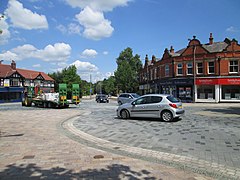Poynton, Cheshire
| Poynton | |
|---|---|
 Poynton shared space town centre, remodelled in 2011 |
|
| Poynton shown within Cheshire | |
| Population | 14,260 (2011 census) |
| OS grid reference | SJ925835 |
| • London | 152 mi (245 km) |
| Civil parish |
|
| Unitary authority | |
| Ceremonial county | |
| Region | |
| Country | England |
| Sovereign state | United Kingdom |
| Post town | STOCKPORT |
| Postcode district | SK12 |
| Dialling code | 01625 |
| Police | Cheshire |
| Fire | Cheshire |
| Ambulance | North West |
| EU Parliament | North West England |
| UK Parliament | |
Poynton is a town in Cheshire, England, on the easternmost fringe of the Cheshire Plain 11 miles (18 km) south-southeast of Manchester, 7 miles (11 km) north of Macclesfield, and 5 miles (8 km) south of . In 2011, it had a population of 14,260.
Poynton was first settled by the Anglo-Saxons. From the Late Middle Ages, coal was mined and the collieries, under the ownership of the Lords Vernon from 1832 until their closure in 1935, were the largest in Cheshire. Consequent urbanisation and socioeconomic development necessitated better transport links; these came with the completion of the Macclesfield Canal through Poynton in 1831 and the arrival of the Manchester and Birmingham Railway in 1845 and the Macclesfield, Bollington and Marple Railway in 1869. In the late 20th century, Poynton became a commuter town for Manchester.
The name of Poynton is of Old English derivation. Having been omitted by the Domesday Book of 1086, the first mention of the manor of Poynton is in 1289 when it was part of the barony of Stockport. Past spellings include Ponynton and Poynington The Warren family held the manor from before 1386 when Edward de Warren married Cicely de Eton of Poynton and Stockport until 1801 when Sir George Warren, the last surviving male, died. He was succeeded by his daughter, Lady Warren Bulkeley. She died childless in 1826 when she left the estate to Frances Maria Warren, Lady Vernon. The Lords Vernon held the estate until the final sale in 1920.
...
Wikipedia

